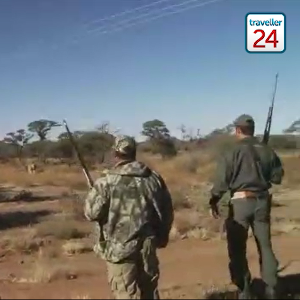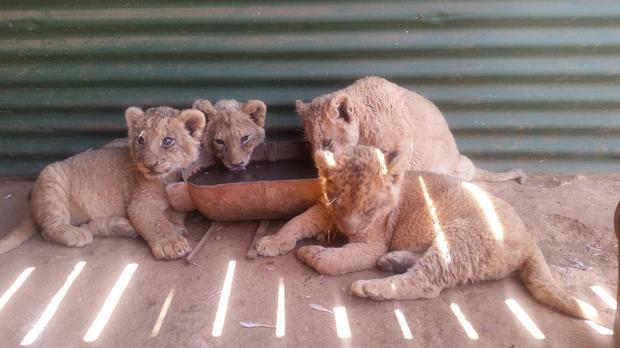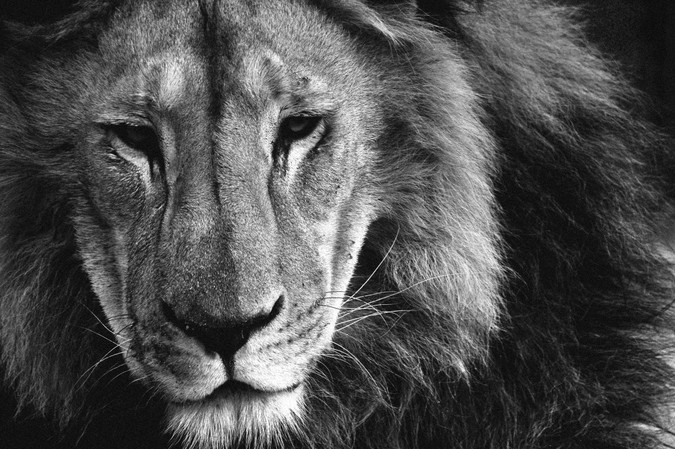2018-03-05 08:59 - Kavitha Pillay

A lion being hunted
World Wildlife Day was celebrated on 3 March under the theme 'Big Cats: Predators under threat'.
One would think that with the multitude of international campaigning for greater protection of Big Cats around the world, more would be done to conserve these endangered animals through sustainable and ethical means.
As the debate between hunting associations and conservationists intensifies regarding captive-bred lion hunting being the answer to conservation of wild lions, more international organisations are expressing their disagreement with the lucrative industry.
The Dallas Safari Club, has recently come out strongly against captive-bred lion hunting, while Safari Club International, one of the largest trophy hunting organisations in the world, says it will no longer allow captive bred lion operators to advertise or market captive bred lions at its annual convention.
A canned hunt is said to be a trophy hunt in which an animal is kept in a confined area, such as in a fenced-in area, increasing the likelihood of the hunter obtaining a kill. Certain parameters within South African law allow for a lion to be released and declared free roaming and open to the 'principle of fare chase' as soon as four days to a month - which is where the global contention lies and the push back against captive-bred lion hunting industry.
However, despite these moves by big players in the industry, canned lion hunting remains rife.
Sadly, the industry is being fed by a society who doesn’t see the dangerous and unethical consequences in captive breeding fostered by cub-petting and lion walk interactions.
The industry is also a result of some hunters and private game reserves who prioritise lining their pockets under the guise that captive breeding and canned hunting are assisting in conserving lions.
With the number of African free-range lions declining alarmingly over the last few decades – and only 20 000 remain today - one would expect greater action to be taken by government authorities such as the Department of Environmental Affairs (DEA). But instead, the DEA has been called out for passing laws that support the lion bone trade industry, which also indirectly perpetuates captive breeding and canned hunting.
As a result, canned lion hunting is still taking place across the country in private game parks.
Footage shared with Traveller24, shows some questionable and unusual behaviour for truly wild lions. Taken last year at an undisclosed location in South Africa, the footage is not for sensitive viewers.
Hunters celebrate as a pride of lion are shot at. The lions react with confusion rather than fear – seemingly unperturbed by human presence yet baffled by the firing of shots, as they refrain from fleeing from humans who shout and shoot at them.
Watch it here:
Traveller24 spoke to anti-canned hunting campaigners and animal welfare activists, as well as the Professional Hunters’ Association of South Africa (Phasa) to identify and differentiate an illegal canned lion hunt from a legal wild hunt.
What makes this a canned lion hunt?
Fiona Miles, SA Director of FOUR PAWS Animal Welfare Foundation, says “there is possibility this is a canned hunt based on the fact that there are so many male lions together”.
“We observe that the lions do not seem to be perturbed by the vehicle, all the shouting and don’t seem to have what normally should be a natural fear, despite gun shots. It was seemingly quite a chaotic situation and with what seems to be 4 or 5 large male lions in close proximity,” she told Traveller24, adding that the hunt “seems pre-organised” and “not professionally executed as one lion was wounded”.
Linda Park, director of Campaign Against Canned Hunting (CACH) also pointed out that “all those lions are male and there are a number of them,” indicating that is unusual in a pride.
“One can clearly see that the lions in this video are used to humans by the way they are standing around looking confused. One can see that all the lions are in pristine condition, full-maned and not showing any of the scarring so typical of wild male lions. This is always a dead giveaway that the lions are captive bred,” Parks adds.
Miles adds that “the lions were proactive towards each other and did not back down and run away after one was shot. I was surprised to see at one stage one actually turned his back on the hunters."
She says another sign is that the “hunters also had time to congratulate each other and relax whilst three lions were in close proximity to them. Although I have seen many such footage pieces, it remains very disturbing to watch and take in”.
Meanwhile, President of Phasa Dries van Coller, says "it is highly unlikely to be a canned hunt as that is illegal and no permit to conduct such a hunt would be issued".
"From the video it is very difficult to draw exact conclusions and substantiate one's assumptions. It is most definitely a captive bred lion hunt.
"The lions are not drugged and appear to be fully coherent. The lions undoubtedly show no fear of the hunters which may indicate that they are captive bred," adds van Coller.
How to tell a canned lion hunt apart from a wild, legal hunt?
Miles says that in her opinion “the fact that there are only male lions and no female lions in sight perhaps says there is no pride and therefore not a wild hunt. It does not seem like a natural formation.”
According to Phasa, “various factors need to be considered” when determining the difference, adding that “any behaviour that raises suspicion, for example appearing drugged, should be questioned and reported”. Phasa says that the South African Predator Association’s (SAPA) norms and standards outlines “what is not acceptable practice”.
When asked to differentiate between 'fair chase' and a 'canned hunt', van Coller told Traveller24 that both terms "are open to various interpretations".
"The lions were hunted on foot - from what I can see no bait or artificial sound being used to attract the lions. To what extent the lions can evade the hunters can only be speculated on as the size of the area is unknown but the area does have adequate cover and brush. The question is then do these factors contribute to fair chase. As this is a subjective question you will always get varying answers," he explains.
"The lions were willing to defend themselves. Too much is left open for interpretation and I would be foolish to make blanket statements before having all the details to make an informed decision," he says, adding that while some people may find the footage offensive, others will not.
Laws and policies
Van Coller says that to differentiate between canned hunting and captive bred hunting one needs to look at legislation. "Captive bred lion hunting meets all the criteria the minister has laid down in the environmental legislation for which a permit is issued and is usually accompanied by a conservation official," he says.
"Legislation is very clear if a lion is bred in captivity it will always remain a captive bred lion. If a captive bred lion is released into a game reserve it will still remain a captive bred lion even though it is free roaming. This is why a free roaming captive bred lion is referred to as a ranch lion," says Phasa, whose members may only hunt ranched lions at 8 SAPA Accredited Hunting Ranches in the country.
"The offspring of a free roaming lion born in an extensive wildlife system will be the first generation of wild lions. Certain criteria are once again applicable," adds van Coller.
Meanwhile, Parks says that “the cause of the confusion is that there is no legal definition of canned hunting. The phrase is not even mentioned in the TOPS regulations." Park adds that with no legal definition, anyone can claim that canned hunting is banned or permitted - "whichever suits his purpose", she says.
Parks says that internationally, captive breeding and canned hunting has been receiving a negative reaction, with big hunting clubs like SCI and Dallas Safari “being vocal in their condemnation”.
“Unfortunately, in South Africa the industry is supported by the DEA,” says Parks, adding that the DEA “has no intention of closing down the industry as they see it as sustainable”.
The DEA has confirmed this in a statement issued to Traveller24. Albi Modise, Chief director for Communications at DEA says, "the fact that South Africa has legislative protection in place for endangered and threatened species and subscribes to the principles of sustainable utilisation of natural resources, there is no reason to prohibit the breeding of lion in captivity for hunting purposes."
"The Department, therefore, has no intention of closing down the captive lion breeding and hunting industries in South Africa in the near future," says DEA.
Modise says that DEA's Minister "has been consistent in qualifying that so-called canned hunting is not allowed, or condoned, by any law in South Africa", adding that any contraventions should be reported to authorities.
"The Minister instituted a compliance inspection of captive lion breeding facilities in South Africa. Phase 1 has just been completed and the report is being prepared for the Minister and the MECs of environment that will include recommendation on matters of compliance," adds DEA.
Canned hunts and conservation
Ian Michler of Blood Lions reiterates that “the canned or captive hunting industry plays no role whatsoever in the conservation of the species. Not a single recognised lion researcher or conservation agency supports the captive breeding industry or the captive hunting industry.
“The claims that are being made are incorrect and are done to try and legitimise what the operators understand to be awful practices. But because of the money involved, they continue,” he adds.
According to CACH, “the claim that every tame lion shot is a wild lion saved rests on false assumptions. The falsity is the notion that every hunter who is prevented from shooting a tame lion will automatically go out and kill a wild lion.
“In actual fact, canned hunters have a different mind-set from those who call themselves trophy hunters. Trophy hunters say that they would never kill a captive animal because of the absence of what they call ‘fair chase’. A key part of how they define themselves is by declaring how hard it was for them to earn their trophy.”
Rand-value of the canned hunting industry
“Putting a Rand value on a killing is a difficult one. One can go online and order a lion before even arriving in the country - something you certainly cannot do with a wild hunt,” says Park, adding that prices will depend on size, mane and whether there is surplus stock.
She adds that since the lion bone trade has come into effect, “nothing is wasted”, and lion bones, teeth, claws and other parts are sold to eastern countries.
According to Blood Lions, the exact value of the industry is unknown, “as it has become difficult for the canned hunters to get permits to export trophies to the USA”.
“We believe however that they have started looking for alternative markets in places like Russia and the old Eastern Bloc countries.
“At the time of the film’s release, we knew that over 1 000 lions were being hunted per annum and these went for prices as little as US$5 000 (about R59 900 at R11.95/$) for a female to almost US$50 000 for large black-maned males. But since the US Fish and Wildlife bans, plus the statements from various US hunting bodies condemning canned or captive hunting, these numbers may be somewhat lower now,” explains Blood Lions.
How can the average person make a difference and bring an end to this industry?
CACH advises the average person to “do their research” before visiting any place that has captive bred lions.
“Ask questions if you do end up somewhere that does not feel right. Take photos and report to one of the NGOs or the NSPCA Wildlife Unit. Talk to your friends as well. Each one of us has a responsibility to make a difference. Each one of us has the power to do so,” adds Park.
Blood Lions says that hunters must not come to South Africa to hunt captive bred lions, while tourists must not visit lion farms and parks - “especially those offering cub petting and walking with lion activities”.
“In addition, watch Blood Lions to get a better understanding of the predator breeding industry and all the revenue streams,” Michler adds.
Meanwhile Miles says that “by demanding a change in legislation”, people can make a difference to the industry. “Participate in ethical tourism activities,” adds Miles, saying that it is also important to “educate everyone to respect life”.




